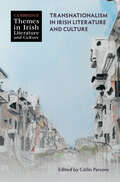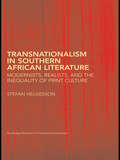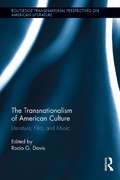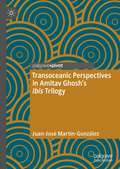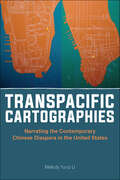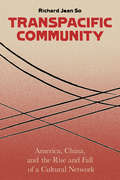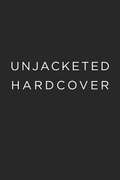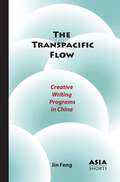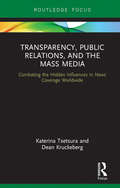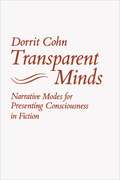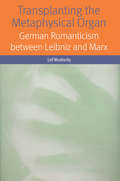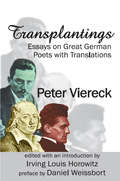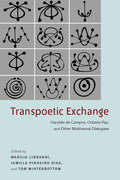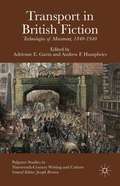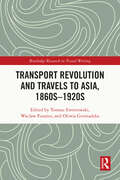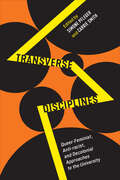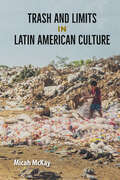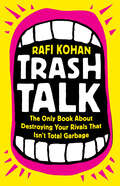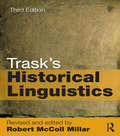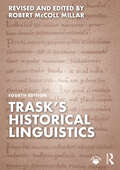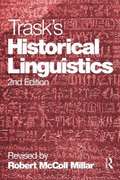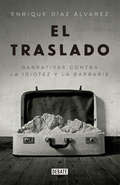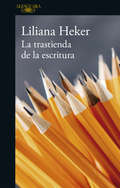- Table View
- List View
Transnationalism in Irish Literature and Culture (Cambridge Themes in Irish Literature and Culture)
by Cóilín ParsonsTransnationalism in Irish Literature and Culture offers a wide-ranging set of essays exploring the travels of Irish literature and culture over the last century and more. The essays focus on writers and artists whose work has been taken up and re-read overseas; on cultural producers who have engaged with transnational scales in their work; and on critical practices that pay attention to comparative, global, and planetary dimensions of Irish literature and culture. Nation and territory have long been central to cultural production in Ireland, especially as both remain significantly contested, but a continued focus on these inherited scales has hindered critical attention to transnational routes and roots that exist alongside and challenge the nation. This volume sets agenda for the future of study of transnationalism in Irish literature and culture, recognizing the need for a new set of theories and methodologies that are adequate to our emerging world.
Transnationalism in Southern African Literature: Modernists, Realists, and the Inequality of Print Culture (Routledge Research in Postcolonial Literatures)
by Stefan HelgessonConsidering the growing interest in South African Literature at the moment, this study looks at both the Anglophone literature of South Africa and the lusophone literature of Angola and Mozambique. Stefan Helgesson suggests that the prevalence of ‘colonial’ languages such as English and Portuguese in ‘anticolonial’ or ‘postcolonial’ African Literature is primarily an effect of the print network. Helgesson aims to demystify the authority of English and Portuguese by stressing the materiality of the print medium and emphasising the strong transnational and transcontinental vectors of southern African literature after the Second World War.
The Transnationalism of American Culture: Literature, Film, and Music (Routledge Transnational Perspectives on American Literature)
by Rocío G. DavisThis book studies the transnational nature of American cultural production, specifically literature, film, and music, examining how these serve as ways of perceiving the United States and American culture. The volume’s engagement with the reality of transnationalism focuses on material examples that allow for an exploration of concrete manifestations of this phenomenon and trace its development within and outside the United States. Contributors consider the ways in which artifacts or manifestations of American culture have traveled and what has happened to the texts in the process, inviting readers to examine the nature of the transnational turn by highlighting the cultural products that represent and produce it. Emphasis on literature, film, and music allows for nuanced perspectives on the way a global phenomenon is enacted in American texts within the U.S, also illustrating the commodification of American culture as these texts travel. The volume therefore serves as a coherent examination of the critical and creative repercussions of transnationalism, and, by juxtaposing a discussion of creativity with critical paradigms, unveils how transnationalism has become one of the constitutive modes of cultural production in the 21st century.
Transoceanic Perspectives in Amitav Ghosh’s Ibis Trilogy (Maritime Literature and Culture)
by Juan-José Martín-GonzálezTransoceanic Perspectives in Amitav Ghosh’s Ibis Trilogy studies Ghosh’s Sea of Poppies (2008), River of Smoke (2011) and Flood of Fire (2015) in relation to maritime criticism. Juan-José Martín-González draws upon the intersections between maritime criticism and postcolonial thought to provide, via an analysis of the Ibis trilogy, alternative insights into nationalism(s), cosmopolitanism and globalization. He shows that the Victorian age in its transoceanic dimension can be read as an era of proto-globalization that facilitates a materialist critique of the inequities of contemporary global neo-liberalism. The book argues that in order to maintain its critical sharpness, postcolonialism must re-direct its focus towards today’s most obvious legacy of nineteenth-century imperialism: capitalist globalization. Tracing the migrating characters who engage in transoceanic crossings through Victorian sea lanes in the Ibis trilogy, Martín-González explores how these dispossessed collectives made sense of their identities in the Victorian waterworlds and illustrates the political possibilities provided by the sea crossing and its fluid boundaries.
Transpacific Cartographies: Narrating the Contemporary Chinese Diaspora in the United States (Asian American Studies Today)
by Melody Yunzi LiTranspacific Cartographies examines how contemporary Chinese diasporic narratives address the existential loss of home for immigrant communities at a time of global precarity and amid rising Sino-US tensions. Focusing on cultural productions of the Chinese diaspora from the 1990s to the present -- including novels by the Sinophone writers Yan Geling (The Criminal Lu Yanshi), Shi Yu (New York Lover), Chen Qian (Listen to the Caged Bird Sing), and Rong Rong (Notes of a Couple), as well as by the Anglophone writer Ha Jin (A Free Life; A Map of Betrayal), selected TV shows (Beijinger in New York; The Way We Were), and online literature -- Melody Yunzi Li argues that the characters in these stories create multilayered maps that transcend the territorial boundaries that make finding a home in a foreign land a seemingly impossible task. In doing so, these “maps” outline a transpacific landscape that reflects the psycho-geography of homemaking for diasporic communities. Intersecting with and bridging Sinophone studies, Chinese American studies, and diaspora studies and drawing on theories of literary cartography, Transpacific Cartographies demonstrates how these “maps” offer their readers different paths for finding a sense of home no matter where they are.
Transpacific Community: America, China, and the Rise and Fall of a Global Cultural Network
by Richard Jean SoIn the turbulent years after World War I, American novelist Pearl S. Buck, African American singer and activist Paul Robeson, left-wing journalist Agnes Smedley, and Chinese authors Lao She and Lin Yutang sought to transform the terms by which the United States and China, or more broadly "East" and "West," knew each other. Individually, they produced works that altered American conceptions of China and vice versa. Together, they collaborated on political projects that synthesized American and Chinese visions of equality. Their network drew from radical visions of political revolution and new technologies of communication. Their transpacific community upset traditional routes of power and articulated a new course for East-West cultural exchange.
Transpacific Community: America, China, and the Rise and Fall of a Cultural Network
by Richard Jean SoIn the turbulent years after World War I, a transpacific community of American and Chinese writers and artists emerged to forge new ideas regarding aesthetics, democracy, internationalism, and the political possibilities of art. Breaking with preconceived notions of an "exotic" East, the Americans found in China and in the works of Chinese intellectuals inspiration for leftist and civil rights movements. Chinese writers and intellectuals looked to the American tradition of political democracy to inform an emerging Chinese liberalism. This interaction reflected an unprecedented integration of American and Chinese cultures and a remarkable synthesis of shared ideals and political goals.The transpacific community that came together during this time took advantage of new advances in technology and media, such as the telegraph and radio, to accelerate the exchange of ideas. It created a fast-paced, cross-cultural dialogue that transformed the terms by which the United States and China—or, more broadly, "West" and "East"—knew each other. Transpacific Community follows the left-wing journalist Agnes Smedley's campaign to free the author Ding Ling from prison; Pearl Buck's attempt to fuse Jeffersonian democracy with late Qing visions of equality in The Good Earth; Paul Robeson's collaboration with the musician Liu Liangmo, which drew on Chinese and African American traditions; and the writer Lin Yutang's attempt to create a typewriter for Chinese characters. Together, these individuals produced political projects that synthesized American and Chinese visions of equality and democracy and imagined a new course for East-West relations.
Transpacific Displacement Ethnography, Translation, and Intertextual Travel in Twentieth-Century American Literature
by Yunte HuangHuang traces the transpacific displacement of cultural meanings through twentieth-century America's imaging of Asia and relates Imagism to earlier linguistic ethnographies of Asia and to racist representations of Asians in American pop culture, such as the book and movie character Charlie Chan, then shows that Asian American writers subject both literary Orientalism and racial stereotyping to double ventriloquism and countermockery.
The Transpacific Flow: Creative Writing Programs in China (Asia Shorts)
by Jin FengWhat happens when a US cultural institution is imported to China, the purported chief rival of the United States in the twenty-first century? The first book-length account of university-based creative writing programs in China, this book reveals how Chinese intellectuals adapt American-style writing programs such as the Iowa Writers’ Workshop and the International Writing Program at Chinese universities to seek agency and literary innovation in the last two decades. The rise of creative writing programs in China explains broader issues of cultural production in an increasingly authoritarian and market-oriented postsocialist state. By telling a unique story of Chinese intellectuals’ interactions with an influential Western cultural institution, this book also shows how varied cultural and geopolitical priorities can rewrite the story of the global influence of the United States.
Transparency, Public Relations and the Mass Media: Combating the Hidden Influences in News Coverage Worldwide (Routledge Focus on Public Relations)
by Dean Kruckeberg Katerina TsetsuraThis book is about media transparency and good-faith attempts of honesty by both the sources and the gate-keepers of news and other information that the mass media present as being unbiased. Specifically, this book provides a theoretical framework for understanding media transparency and its antithesis--media opacity--by analyzing extensive empirical data that the authors have collected from more than 60 countries throughout the world. The practice of purposeful media opacity, which exists to greater or lesser extents worldwide, is a powerful hidden influencer of the ostensibly impartial media gate-keepers whose publicly perceived role is to present news and other information based on these gate-keepers’ perception of this information’s truthfulness. Empirical data that the authors have collected globally illustrate the extent of media opacity practices worldwide and note its pervasiveness in specific regions and countries. The authors examine, from multiple perspectives, the complex question of whether media opacity should be categorically condemned as being universally inappropriate and unethical or whether it should be accepted—or at least tolerated—in some situations and environments.
Transparent Minds: Narrative Modes for Presenting Consciousness in Fiction
by Dorrit Claire CohnThis book investigates the entire spectrum of techniques for portraying the mental lives of fictional characters in both the stream-of-consciousness novel and other fiction. Each chapter deals with one main technique, illustrated from a wide range of nineteenth- and twentieth-century fiction by writers including Stendhal, Dostoevsky, James, Mann, Kafka, Joyce, Proust, Woolf, and Sarraute.
Transplanting the Metaphysical Organ: German Romanticism between Leibniz and Marx (Forms of Living)
by Leif WeatherbyAround 1800, German romanticism developed a philosophy this study calls “Romantic organology.” Scientific and philosophical notions of biological function and speculative thought converged to form the discourse that Transplanting the Metaphysical Organ reconstructs—a metaphysics meant to theorize, and ultimately alter, the structure of a politically and scientifically destabilized world.
Transplantings: Essays on Great German Poets with Translations
by Peter ViereckOn being told that translation is an impossible thing, Anatole France replied: precisely, my friend; the recognition of that truth is a necessary preliminary to success in art. The task of Transplantings is to add flesh and bones to that familiar quip. Indeed, Daniel Weissbort notes that Viereck's study represented a sixty-five year long project. Now, it is finally being brought to print in its full form, with the completion of the final manuscript shortly before Viereck's death.If translation is a special genre in its own right, the translation of poetry, especially from major foreign languages, is a special subset of that genre. What emerges in the imperfect act of translation is an aesthetic dimension that Viereck considers unique in its own right. Transplantings provides new insight into Viereck as a poet of substance, but more than that as a public intellectual. He is critical in probing the work of the major figures such as Stefan George and Georg Heym. To round out this monumental new look at German poetical history, Viereck reviews Goethe, Novalis, and Rilke among others.For Viereck, the difference between the poetical and the political is critical. The quality of poetry is not measured by politics, nor can the worth of political action be defined by commitment to the poetical. The experience of German thought, as well as French and Italian efforts, reveals a divide that can be narrowed but hardly bridged by rhetoric. Transplantings does not simplify the task of the reader. Rather it shows without doubt that the passion of great poetry is part of a national tradition. Efforts at translation indicate how such poetry becomes part of an international culture. This is a major work by one of the great thinkers of the twentieth century. It merits reading, and then, re-reading.
Transpoetic Exchange: Haroldo de Campos, Octavio Paz, and Other Multiversal Dialogues (Bucknell Studies in Latin American Literature and Theory)
by Marília Librandi Jamille Pinheiro Dias Tom Winterbottom Enrico Mario Santí João Adolfo Hansen Marjorie Perloff Antonio Cicero Luiz Costa-Lima Odile Cisneros Charles A. Perrone Kenneth David Jackson Benedito Nunes Jerome Rothenberg Keijiro Suga André Vallias Charles BernsteinTranspoetic Exchange illuminates the poetic interactions between Octavio Paz (1914-1998) and Haroldo de Campos (1929-2003) from three perspectives--comparative, theoretical, and performative. The poem Blanco by Octavio Paz, written when he was ambassador to India in 1966, and Haroldo de Campos’ translation (or what he calls a “transcreation”) of that poem, published as Transblanco in 1986, as well as Campos’ Galáxias, written from 1963 to 1976, are the main axes around which the book is organized. <P><P> The volume is divided into three parts. “Essays” unites seven texts by renowned scholars who focus on the relationship between the two authors, their impact and influence, and their cultural resonance by exploring explore the historical background and the different stylistic and cultural influences on the authors, ranging from Latin America and Europe to India and the U.S. The second section, “Remembrances,” collects four experiences of interaction with Haroldo de Campos in the process of transcreating Paz’s poem and working on Transblanco and Galáxias. In the last section, “Poems,” five poets of international standing--Jerome Rothenberg, Antonio Cicero, Keijiro Suga, André Vallias, and Charles Bernstein. <P><P> Paz and Campos, one from Mexico and the other from Brazil, were central figures in the literary history of the second half of the 20th century, in Latin America and beyond. Both poets signal the direction of poetry as that of translation, understood as the embodiment of otherness and of a poetic tradition that every new poem brings back as a Babel re-enacted. <P><P> This volume is a print corollary to and expansion of an international colloquium and poetic performance held at Stanford University in January 2010 and it offers a discussion of the role of poetry and translation from a global perspective. The collection holds great value for those interested in all aspects of literary translation and it enriches the ongoing debates on language, modernity, translation and the nature of the poetic object. <P><P> Published by Bucknell University Press. Distributed worldwide by Rutgers University Press.
Transport in British Fiction
by Adrienne E. Gavin Andrew F. HumphriesTransport in British Fiction: Technologies of Movement, 1840—1940 is the first essay collection devoted to transport and its various types - horse, train, tram, cab, omnibus, bicycle, ship, car, air and space - in British fiction. Gathering international expertise, its 14 original essays explore the ways in which the social, historical, and cultural impacts of transport integrate with the concerns of fiction across a century marked by both unprecedented technological change and the entrenchment of the novel as the dominant literary form. Analysing textual synthesis of technological advances with rapidly shifting cultural perspectives, the volume explores fiction's fascination with transport's symbolism and its impact upon character, relationships, and society. Exploring transport in contexts including gender, class, sexuality, colonialism, war, urbanism, modernity, travel, crime, and science fiction, the volume offers innovative perspectives on the fictional portrayal of new transport technologies that were as democratizing and progressive as they were threatening and destabilizing.
Transport Revolution and Travels to Asia, 1860s-1920s (Routledge Research in Travel Writing)
by Wacław Forajter Oliwia GromadzkaDuring the “long” 19th century, a technological revolution occurred, leading to the emergence of new means of transport such as steamships, railways, cars, aeroplanes, bicycles, and rickshaws. This transport revolution not only fundamentally transformed modes of travel and made distant lands more accessible, but it also significantly impacted how travellers experienced the world. The authors of this volume aim to deepen the understanding of the influence of these new modes of transportation and their coexistence with older ones by incorporating a comprehensive range of sources written by both European and Asian travellers. The approach presented in this volume is inspired by the anthropology of the senses, the sociology of travel, and the cultural history of transport. These methodological frameworks are applied to accounts of travels to, from, and within Asia. This perspective enables a focus on various contexts not visible in Europe, including imperialism, Eurocentric approaches to modernisation, and the reactions of colonised peoples to these developments.
Transverse Disciplines: Queer-Feminist, Anti-racist, and Decolonial Approaches to the University
by Simone Pfleger Carrie SmithFor at least a decade, university foreign language programs have been in decline throughout the English-speaking world. As programs close or are merged into large multi-language departments, disciplines such as German studies find themselves struggling to survive. Transverse Disciplines offers an overview of the current research on the humanities and the academy at large and proposes creative and courageous ideas for the university of the future. Using German studies as a case study, the book examines localized academic work in Australia, Canada, the United Kingdom, and the United States in order to model new ideas for invigorated thinking beyond disciplinary specificity, university communities, and entrenched academic practices. In essays that are theoretical, speculative, experimental, and deeply personal, contributors suggest that German studies might do better to stop trying to protect existing national and disciplinary arrangements. Instead, the discipline should embrace feminist, queer, anti-racist, and decolonial academic practices and commitments, including community-based work, research-creation, and scholar activism. Interrogating the position of researchers, teachers, and administrators inside and outside academia, Transverse Disciplines takes stock of the increasingly tenuous position of the humanities and stakes a claim for the importance of imagining new disciplinary futures within the often restrictive and harmful structures of the academy.
Trash and Limits in Latin American Culture
by Micah McKayThe ecological, social, and aesthetic functions of garbage in literature and film from Argentina to Mexico This book looks at the role of waste in Latin American cultural texts from the twentieth and twenty-first centuries and makes the case for foregrounding trash as an object of analysis in literary and cultural studies in Spanish America and Brazil. By considering how writers and filmmakers engage with the theme, Micah McKay argues that garbage illuminates key limits related to the region’s experience with contemporary capitalism. Recognizing trash as an important social reality, McKay traces its appearance in a diverse range of products: novels and documentary films with dumps as settings, short stories whose main characters are garbage pickers, and works that portray writing as a process of piecing together found materials. McKay argues that waste and the problems it poses are key to understanding marginalization, political struggle, and the production of aesthetic value. Drawing on insights from material ecocriticism, discard studies, and biopolitics, McKay theorizes that trash opens a space of reflection on what it means to be human, the possibilities for building community amid catastrophe, gendered notions of labor and care, and the pitfalls of neoliberal environmentalism. McKay shows how trash in literature and film helps readers and viewers contemplate the limits of how we inhabit the planet. Publication of this work made possible by a Sustaining the Humanities through the American Rescue Plan grant from the National Endowment for the Humanities.
Trash Talk: The Only Book About Destroying Your Rivals That Isn't Total Garbage
by Rafi Kohan&“You&’re mad at me, but I am killing you.&”—NBA star Gary Payton&“Find the hate.&”—NFL star Warren Sapp&“Why can&’t you be more like Rafi Kohan?&”—your mom, probably Whether in basketball, football, or MMA, athletes talk trash to each other—and sometimes to fans—like it&’s their job. And in some ways, it is: sports only matter if we decide to care about them. And insulting your opponent, or playing the heel, is probably the fastest route to making someone care. Talking smack is as old as the bible; it&’s perhaps the original sport. But until now, there&’s never been a book about it. In this lively, often hilarious history, Rafi Kohan interviews some of the world&’s top competitors—on the petty rivalries and mind games that fuel them. He talks to point guards and soccer strikers, cricketers and insult comedians, forming a theory along the way about the surprising and influential role that name-calling plays in our world. Brilliantly original and wide-ranging, Trash Talk is a book for sports fans, culture mavens, or anyone looking to get an edge.
Trask's Historical Linguistics
by Robert Mccoll Millar Larry TraskTrask's Historical Linguistics, Third Edition, is an accessible introduction to historical linguistics - the study of language change over time. This engaging book is illustrated with language examples from all six continents, and covers the fundamental concepts of language change, methods for historical linguistics, linguistic reconstruction, sociolinguistic aspects of language change, language contact, the birth and death of languages, language and prehistory and the issue of very remote relations. This third edition of the renowned Trask's Historical Linguistics is fully revised and updated and covers the most recent developments in historical linguistics, including: more detail on morphological change including cutting-edge discussions of iconization coverage of recent developments in sociolinguistic explanations of variation and change new case studies focusing on Germanic languages and American and New Zealand English, and updated exercises covering each of the topics within the book a brand new companion website featuring material for both professors and students, including discussion questions and further exercises as well as commentaries on the exercises within the book. Trask's Historical Linguistics is essential reading for all students of language, linguistics and related disciplines. The accompanying website can be found at www.routledge.com/cw/trask
Trask's Historical Linguistics
by Robert McColl Millar R L TraskTrask’s Historical Linguistics provides an accessible introduction to historical linguistics – the study of language change over time. This engaging book is illustrated with language examples from all six continents, and covers the fundamental concepts of language change, methods for historical linguistics, linguistic reconstruction, sociolinguistic aspects of language change, language contact, the birth and death of languages, language and prehistory, and the issue of very remote relations. The fourth edition of this renowned textbook is fully revised and updated and covers the most recent developments in historical linguistics, including: A thorough reworking of sections on morphological and syntactic change, incorporating progress in areas such as grammaticalization and the discussion of the Indo-European ‘homeland’ Discussion and analysis of ‘folk’ historical linguistics and its connection with some of the more eccentric views of professional linguists An expanded discussion of language contact, historical sociolinguistics, and language planning, including a discussion of contemporary competing views on the genesis and nature of creoles, and their importance in our understanding of radical linguistic change Updated support material including suggestions for essay questions and a larger number of supporting examples of the phenomena described in the book Trask’s Historical Linguistics is essential reading for advanced undergraduate and postgraduate students of historical linguistics as well as any student looking for a grounded introduction to the English language.
Trask's Historical Linguistics
by Robert Mccoll Millar R. L. TraskThis book is an introduction to historical linguistics - the study of language change over time. Written in an engaging style and illustrated with examples from a wide range of languages, the book covers the fundamental concepts of language change, methods for historical linguistics, linguistic reconstruction, sociolinguistic aspects of language change, language contact, the birth and death of languages, language and prehistory and the issue of very remote relations. A minimal knowledge of linguistic concepts is needed and the book is suitable for students approaching the subject for the first time. The exercises will be particularly useful to teachers and students alike.
El traslado: Narrativas contra la idiotez y la barbarie
by Enrique Díaz ÁlvarezEnrique Díaz Álvarez invita a los lectores a prestar atención a aquellas narrativas que nos sensibilizan contra el abuso de poder, el racismo, el fanatismo, el dolor de los demás. Un ensayo cuyo punto de partida son los flujos migratorios actuales como espacio ejemplar para analizar las formas de luchar contra el fanatismo y la apatía de las sociedades contemporáneas. Nada es más frecuente en las sociedades contemporáneas que el miedo y la indiferencia hacia lo extraño. Parecemos incapaces de desechar los prejuicios que impiden cuestionar los relatos discriminatorios que nos separan. Sin duda, buena parte de la decadencia de la vida pública tiene raíz en la poca disposición para ponernos en el lugar del otro. "Un acto de hospitalidad no puede ser sino poético", dice Jacques Derrida en el epígrafe de este libro, cuyo punto de partida es una premisa fundamental: la imaginación es un acto de resistencia política en tanto que suscita el traslado, esto es, la posibilidad de experimentar significativamente la vida de los otros. Hay que tener en cuenta este poder para hospedar e implicarnos con cuerpos e historias ajenas si queremos combatir la barbarie y esa idiotez que nos aísla de lo público. La propuesta de esta obra es decisiva: para revertir algo del descrédito de la política debe prestarse atención a aquellas narrativas que nos sensibilizan contra el abuso de poder, el racismo, el fanatismo, el dolor de los demás. La vida en común nos exige cultivar ese simulacro que revela la individualidad y las condiciones sociales de personas con otra ideología, religión o cultura. Otros autores han opinado: "De Enrique Díaz Álvarez cabía esperar este paso: hábil montador de historias en el cine, se ha trasladado al ensayo y propone una literatura de resistencia ante los discursos invasores. Un libro muy sugerente, creativo, absolutamente recomendable." - Enrique Vila-Matas.
El traslado: Narrativas contra la idiotez y la barbarie
by Enrique Díaz ÁlvarezEnrique Díaz Álvarez invita a los lectores a prestar atención a aquellas narrativas que nos sensibilizan contra el abuso de poder, el racismo, el fanatismo, el dolor de los demás. Un ensayo cuyo punto de partida son los flujos migratorios actuales como espacio ejemplar para analizar las formas de luchar contra el fanatismo y la apatía de las sociedades contemporáneas. Nada es más frecuente en las sociedades contemporáneas que el miedo y la indiferencia hacia lo extraño. Parecemos incapaces de desechar los prejuicios que impiden cuestionar los relatos discriminatorios que nos separan. Sin duda, buena parte de la decadencia de la vida pública tiene raíz en la poca disposición para ponernos en el lugar del otro. "Un acto de hospitalidad no puede ser sino poético", dice Jacques Derrida en el epígrafe de este libro, cuyo punto de partida es una premisa fundamental: la imaginación es un acto de resistencia política en tanto que suscita el traslado, esto es, la posibilidad de experimentar significativamente la vida de los otros. Hay que tener en cuenta este poder para hospedar e implicarnos con cuerpos e historias ajenas si queremos combatir la barbarie y esa idiotez que nos aísla de lo público. La propuesta de esta obra es decisiva: para revertir algo del descrédito de la política debe prestarse atención a aquellas narrativas que nos sensibilizan contra el abuso de poder, el racismo, el fanatismo, el dolor de los demás. La vida en común nos exige cultivar ese simulacro que revela la individualidad y las condiciones sociales de personas con otra ideología, religión o cultura. Otros autores han opinado: "De Enrique Díaz Álvarez cabía esperar este paso: hábil montador de historias en el cine, se ha trasladado al ensayo y propone una literatura de resistencia ante los discursos invasores. Un libro muy sugerente, creativo, absolutamente recomendable." - Enrique Vila-Matas. "De Enrique Díaz Álvarez cabía esperar este paso: hábil montador de historias en el cine, se ha trasladado al ensayo y propone una literatura de resistencia ante los discursos invasores. Un libro muy sugerente, creativo, absolutamente recomendable." - Enrique Vila-Matas.
La trastienda de la escritura
by Liliana HekerEl esperado libro de Liliana Heker sobre su experiencia en talleres de escritura, una práctica que realiza desde hace más de cuarenta años y por donde han pasado muchos de los escritores más reconocidos de la actualidad argentina. Liliana Heker, Premio Nacional de Literatura 2018 por Cuentos reunidos (Alfaguara, 2016), es una de las escritoras más destacadas de la narrativa nacional. Cuentista extraordinaria y novelista reconocida internacionalmente, presenta ahora un libro destinado a todos los interesados en la escritura de ficción. Sus propios cuentos y novelas, pero también los de autores clásicos y contemporáneos, se analizan y diseccionan para ofrecer al lector las claves de la creación de un texto literario.
